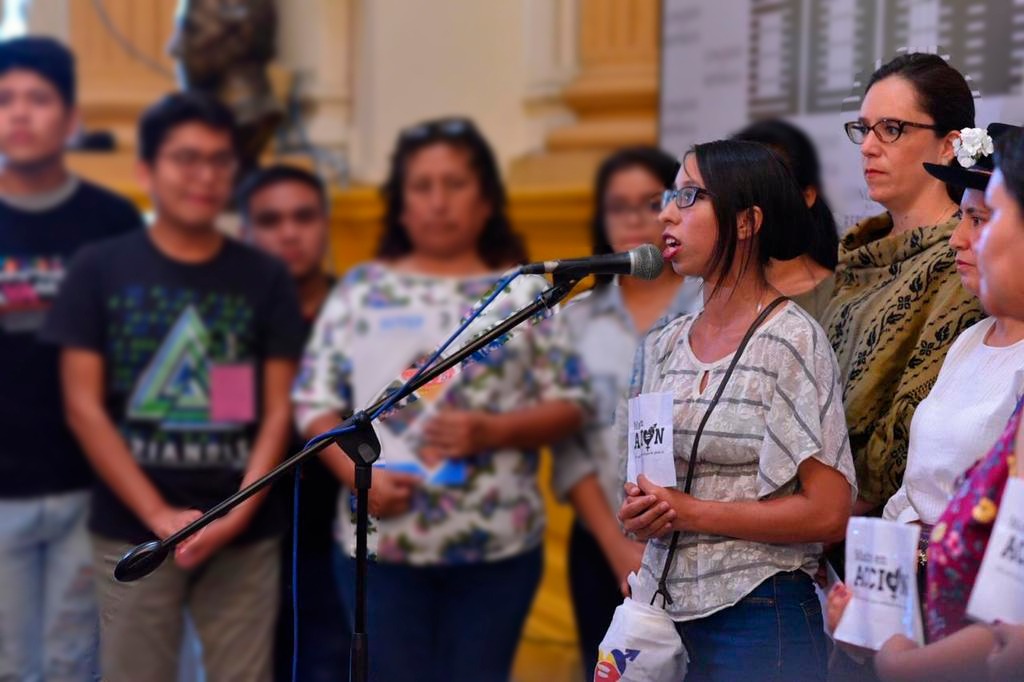Feminist school encourages Peruvian women into politics
Story

In Peru, equity between men and women seemed like a distant reality until recently. 2020 was a revolutionary year for Peruvian women in politics. Women achieved parity in political participation for public offices thanks to the efforts of feminist organizations including Flora Tristan and Movimiento Manuela Ramos, two of the four implementing partners of Cuso International’s Women´s Voice and Leadership project. Amidst political unrest, women were elected to government, bringing a new vision of progress that challenged traditional gender norms and promoted inclusive grow. While Violeta Bermúdez was elected as the Head of Cabinet in November 2020, Elvia Barrios became Peru’s first female president of the Supreme Court of Peru and of the Judicial Power in January 2021. These influential leadership roles shook the foundation of societal norms in Peru creating a sense of pride and opportunity among women.
Ayesha Dávila Torres is a 32-year-old activist for gender equity and sexual reproductive rights and a mother of two. She describes Peru as a land of diversity; of diverse culture, geography and people. And with all the cultural richness, Torres says, comes a piece of historical baggage. According to Torres, bad memories have created a fear of new or different ideas. “People have memories of terrorism. Anti-rights groups continue to report that the system prevails and there are no deep reforms or true changes,” she says. This past has created a hostile environment for women in Peru to grow and develop. “It is very misogynistic, and homo-lesbo-bi-transphobic, with so few opportunities and chances for women and diverse people,” she says. Sadly, she knows this first hand. A victim of sexual violence, the statistics she shares are sobering. “In Peru, 60 to 70 per cent of reports of sexual violation are made by girls, and, to date, there is not a specific policy being applied to prevent and help lower the numbers.”
Cuso International’s Women’s Voice and Leadership project has been working tirelessly to reform these pre-existing memories. Program partners organized feminist schools on leadership and women’s rights as an important way to galvanize women. Between 2020-2021, the feminist schools had enrolled 227 students from 11 regions across Peru. Twenty-eight women leaders also participated in a program directed specifically to women in public office. At these programs, aspiring leaders discussed power dynamics, healing, inclusive growth, gender-based violence, and empowering communities. “The project has helped me to reconfirm and solidify how important it is for women to break from the system and to become the actors of true change ourselves,” says Torres who is an active participant of the feminist school. “It has strengthened my ideas and perceptions about the need to influence the public sector, in Congress, the urgent political participation of women, the real representation.”
On March 8, 2021, the Peruvian Congress approved a new law against political harassment. This decision was a historical achievement and victory for our partners Manuela Ramos Movement and Flora Tristan Peruvian Women’s Center, who have been fighting to have this bill passed for years, but the real winner are Peruvian women. The law will prevent, punish and eradicate violence and harassment against women in political life, encouraging Peruvian women into politics. “The Feminist Schools of Political Training are necessary and useful because they allow women to have tools and precise information to empower themselves, demand and influence the guarantee of their human rights, as well as political participation to be able to legislate in favour of what we need to achieve– real gender equity,” says Torres.
A great example of these spaces of advocacy campaigns and Feminist school is Gahela Cari, a trans woman who ran as candidate for the Congress of Peru. Torres says that “she is a living proof that the political empowerment of women is vital to fight for a place in decision-making spaces and also to break the fear and silence that keep us submissive.”
Over the past two years, Women’s Voice and Leadership has branched out to 14 regions in Peru, successfully reaching out to 2,859,750 people through 35 gender equity campaigns. While the road to equity is a long journey, these significant achievements are a meaningful and promising catalyst for change.
You can help more women like Ayesha by making a donation today .